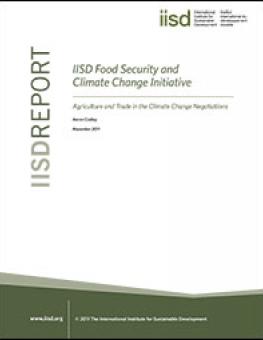
Agriculture and Trade in the Climate Change Negotiations
While there is widespread agreement on the potential benefits of bringing agriculture into an international climate change regime, a number of important sticking points need to be resolved before it will be possible. Trade-related issues are some of the most significant.
As part of IISD's Food Security and Climate Change Initiative, this paper begins by briefly setting out the background, noting the rationale and negotiating the history to date. It then surveys the state of play, unpacking and analyzing the key issues, and suggesting where we might go from here.
Participating experts
You might also be interested in
December 2024 | Carbon Minefields Oil and Gas Exploration Monitor
In November 2024, 23 oil and gas exploration licences were awarded across five countries, with Russia granting the licences that account for the largest portion of embodied emissions.
Increased Support Needed to Achieve India's Clean Energy Goals
India is on track to achieve many of its 2030 clean energy goals but needs to step up government support measures to accelerate the deployment of offshore wind, electric vehicles, and green hydrogen, according to a new report.
Budgeting for Net Zero
This study estimates the cost gap for battery energy storage systems (BESSs), offshore wind, solar photovoltaic (PV), electric vehicles (EVs), and green hydrogen (GH2) to inform government support.
Artisanal and Small-Scale Mining of Critical Minerals
This report examines the potential for artisanal and small-scale mining (ASM) to take an expanded role in the global supply of critical minerals.